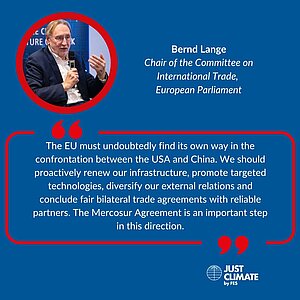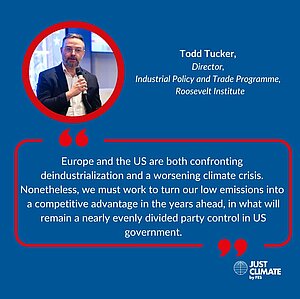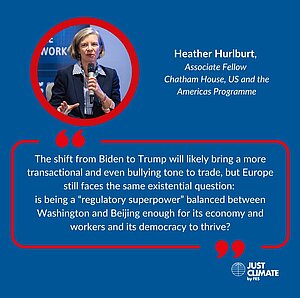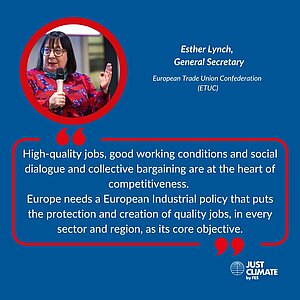The transatlantic relations in for a rough ride – so are workers’ agendas set for a zero-sum game?

Future competitiveness and global leadership will be determined by countries’ performance in clean tech and digital industries. China is challenging industrialised countries in a fierce competition. Europe is determined to hold its own - but the impact on business locations, jobs and technological innovation is already being heavily felt. And now the second Trump term is looming, with trade wars and more geo-economic upheavals. How can we avoid that working people on both sides of the Atlantic are played off against each other? How can we balance the tensions between China and the USA in favour of Europe’s own interests?
To find common answers to these questions, FES Just Climate and FES Future of Work had organised this conference in Brussels on December 11th. The event brought together experts from EU institutions, trade unions, think tanks, and civil society to discuss prospects of an industrial agenda for the EU and US following the US elections.
Bernd Lange, Chair of the Committee on International Trade, European Parliament

All eyes are on America - what does Trump's second term mean for Europe's trade, industry and climate ambitions? FES Just Climate explored this question this week together with our American guests Heather Hurlburt and Todd Tucker. On our panel yesterday, we debated with European partners how the EU can avoid being caught up in the polarization between the US and China. So what options does Europe have? Our panelist Bernd Lange, Chairman of the Trade Committee in the European Parliament, stated:
“The EU must undoubtedly find its own way in the confrontation between the USA and China. We should proactively renew our infrastructure, promote targeted technologies, diversify our external relations and conclude fair bilateral trade agreements with reliable partners. The Mercosur Agreement is an important step in this direction.”
Todd Tucker, Roosevelt Institute, Director of the Industrial Policy and Trade Programme

Silver linings in the transatlantic relations under Trump 2.0? This is what many are now looking for in Europe. During our US-EU week, Todd Tucker from the Roosevelt Institute pointed out the shared challenges along which common interests for cooperation could be explored.
“Europe and the US are both confronting deindustrialization and a worsening climate crisis. Nonetheless, we must work to turn our low emissions into a competitive advantage in the years ahead, in what will remain a nearly evenly divided party control in US government.”
Heather Hurlburt, Chatham House associate fellow

No early Christmas presents for sure, at least as far as Europe's future relationship with China and the USA is concerned. There was some optimism about this in our debates last week. However, our US expert Heather Hurlburt, Chatham House associate fellow, dampened this sentiment. From the US perspective, it may not be enough for the EU to pursue a balanced, rules-based course between the superpowers. Trump could want to see much more on the negotiating table.
"The shift from Biden to Trump will likely bring a more transactional and even bullying tone to trade, but Europe still faces the same existential question: is being a “regulatory superpower” balanced between Washington and Beijing enough for its economy and workers and its democracy to thrive?"
Sebastian Dullien, Professor of International Economics at HTW Berlin and Scientific Director of the Institute for Macroeconomics and Business Cycle Research (IMK) at the Hans Böckler Foundation

Know exactly what you want for yourself. That would be a good start for the EU to prepare for Trump's dealmaker style and a new geo-economic era. A genuine industrial strategy is definitely part of this. After all, as previously reported here in the context of our US-EU debate, strengthening our industries through decarbonization is a potential common concern on both sides of the Atlantic. Sebastian Dullien, director of the Macroeconomic Policy Institute of Hans-Böckler-Stiftung, made a suggestion as to what exactly is at stake on the EU side:
„The most important for Europe’s industrial policy strategy is its coherence and determination. All policy fields – from trade over innovation to public investment – need to be involved, and it is paramount that adequate fiscal means are appropriated.”
Esther Lynch, General Secretary of the European Trade Union Confederation (ETUC)

Competitiveness - for a long time this term was for many a synonym for deregulation and pressure on wages and working conditions. Now the EU uses it to help make our industries innovative and climate-neutral and to push Europe to catch up with the global players. Esther Lynch, General Secretary of the ETUC, when she spoke at our US-EU-event, brings us a narrative making good working conditions and strong labour rights a core ingredient for competitiveness these days:
"High-quality jobs, good working conditions and social dialogue and collective bargaining are at the heart of competitiveness. Europe needs a European Industrial policy that puts the protection and creation of quality jobs, in every sector and region, as its core objective.”
Relevant article on the topic
Author: Claudia Detsch, Director FES Just Climate

Could Trump even be an opportunity for Europe and its Clean Tech Industry?
To keep up in the geo-economic race with China and the US, Europe has no choice but to focus on clean technologies.
Are you interested in finding out more?
Get more insights in our Op-ed article.
Contact
Friedrich-Ebert-Stiftung Climate and Social Justice
Cours Saint Michel 30e
1040 Brussels, Belgium
justclimate(at)fes.de


